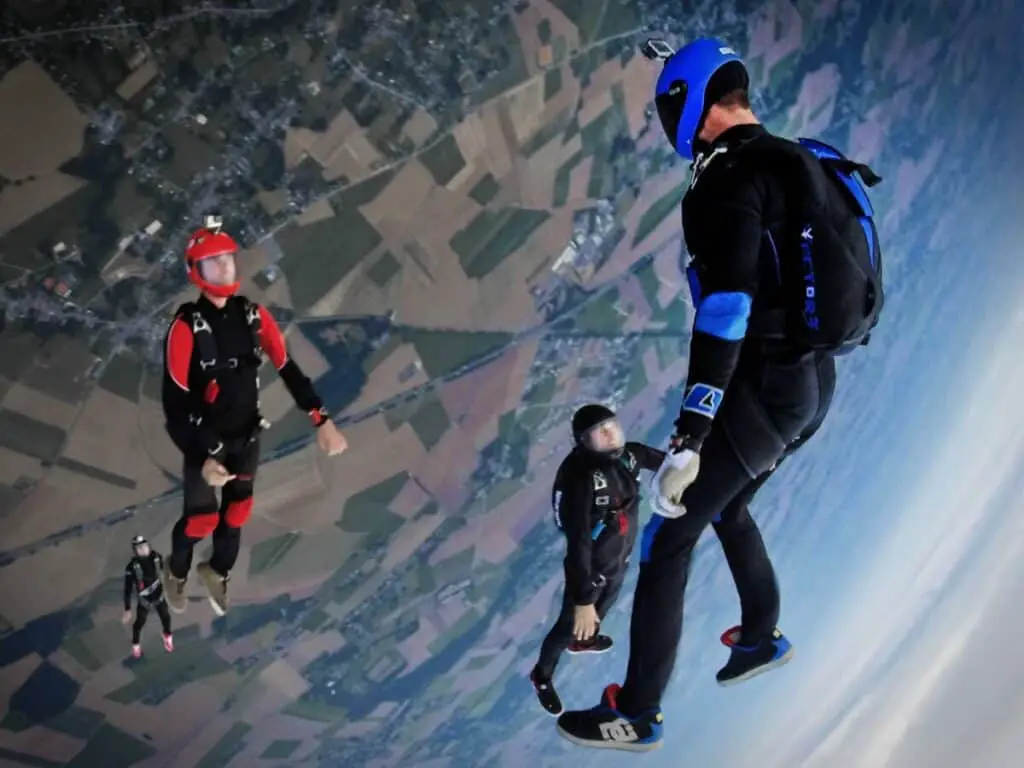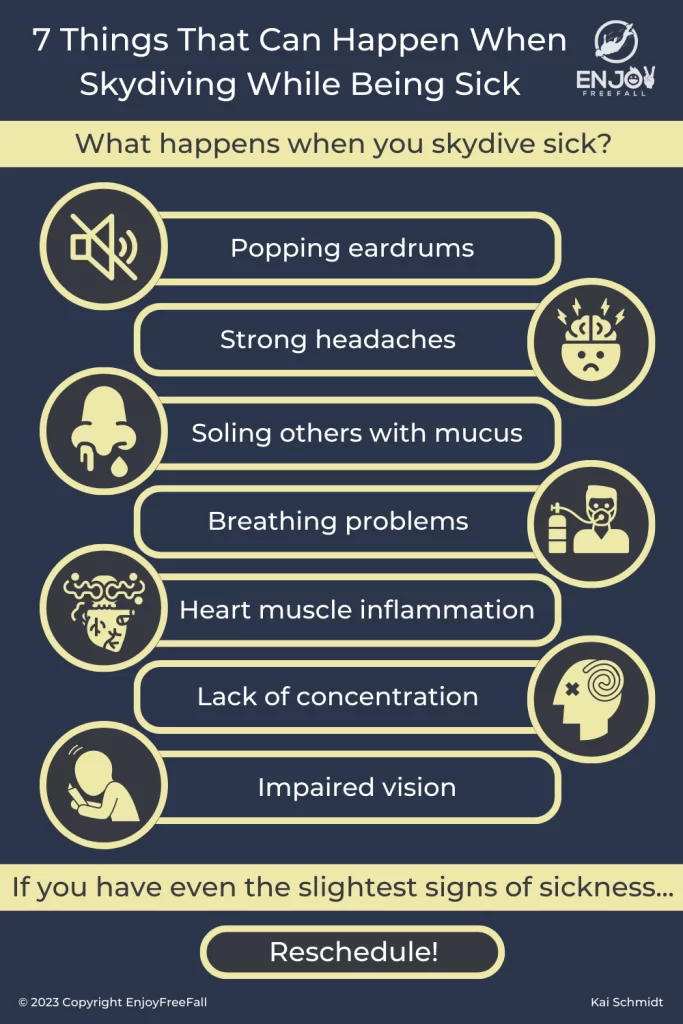
We all know this feeling when we are excited to do something but realize that we caught a cold and feel sick. It is often a tight decision whether we follow our plans or reschedule. When being sick before a skydive, this should come down to an easy decision.
If you feel unwell or sick even to the slightest degree, you should not go on a skydive. Not only will it worsen your physical conditions but is also quite dangerous for you and others. Here are 7 things that can happen, if you are sick and still skydive:
- Popping eardrums
- Strong headaches
- Soiling others with mucus
- Breathing problems
- Heart muscle inflammation
- Lack of concentration
- Impaired vision
Each of these effects is quite unpleasant, however, some of them can also cause fatal consequences for you and others. Let’s go through them, in order to understand what risk you oppose yourself when jumping out of a plane when being sick.
Popping Eardrums When Skydiving Sick
When jumping from 14,000ft (4,250m) you are exposed to a much lesser air pressure than at the ground. Falling from 14,000ft to 2,500ft where you usually deploy the parachute exposes the body to a strong difference in air pressure. You know this feeling from flights when you suddenly feel some pressure in the air and either yawn or eat sweets to balance the pressure difference.
While a healthy body does not have any problems to compensate this pressure difference, a sick body does have extreme difficulties.
One of the major reasons is that your nose might be closed with mucus and therefore your body lacks the ability to release pressure through the nose. As a result, more and more pressure will be executed on your eardrums until they pop.
Not only are popping eardrums extremely painful, but it will also continue to hurt afterwards and takes several weeks to heal.
Strong Headaches When Skydiving Sick
Headaches can be caused by the tissues and structures that surround your brain. During an inflammation the vein structures usually swell to circulate the blood faster which results in a pressure feeling in your head.
This pressured feeling will be intensified tremendously when you jump from 14,000ft. Due to the quick change in air pressure, there will be a pressure difference inside and outside your head. In order to balance this difference, the body will try to release pressure either through the nose or ears and by circulating the blood.
If the nose is closed the body has to make up for it with an increased blood circulation speed, which will result in more swollen blood vessels and much greater headaches.
Soiling Yourself And Others With Mucus During The Skydive
While a running nose is quite annoying on a normal day, it becomes a mess when skydiving. Due to thinner air in the sky, the nose will start running extremely fast when the air becomes thicker. The nose does not only run fast but also uncontrollably – and you will not have a tissue to empty capture the mucus.
At the very best, the mucus will land on yourself and will make your skydive a very unpleasant experience. In the worst case, you will spoil it over to other skydivers that jump after you or over your tandem instructor when doing a tandem jump. Not only will it be extremely embarrassing for you it is also disgusting for the tandem instructor. (Most of the tandem instructors make this experience at least once during their jumps)
Since the Covid-19 pandemic, you also put other people in the airplane and your tandem instructor at risk when skydiving while feeling sick.
An upside of the pandemic is that people are in general more educated about hygiene standard and most of the skydive companies will explicitly ask for your well being before the jump. If you do not feel well, they will not allow you to jump and you shouldn’t.

Breathing Problems During The Free Fall
Breathing while being in freefall can sometimes be difficult because you cut through the air at 125 mph (200 km/h). You are exposed to so much air that it might be hard to breathe in. While this is not a problem, when you feel healthy, your lung volume decreases when being sick.
In addition, your respiratory musculature including your lung and nose will be swollen and inflamed. Therefore, it is already much harder for you to breathe at the ground but becomes three times more difficult when being in freefall. Because the air is also colder in the sky, breathing will give you more pain than at the ground.
While this might not be a strong issue when you jump tandem, it becomes extremely relevant on a solo skydive.
Specifically for beginners, there is a high risk of panicking if you are not able to breathe properly. Panic often results in human errors – something that can be deadly on a skydive.
If you are concerned about your breathing, make sure to check out my article about how skydivers breathe. It clarifies all misconceptions and gives practical tips on the right breathing!
Heart Muscle Inflammation Can Have Long-Lasting Effects After The Skydive
It is commonly known that exercising when having a cold can result in a stroke or heart attack. It can also result in chronic heart failure that no doctor will be able to heal.
While the likelihood is not as high during a skydive (mainly because it only lasts 10 minutes in contrast to a 30 minutes workout), the risk of getting a chronic heart failure still exists.
You are normally very excited and nervous before a skydive and when you jump your body initiates the so-called “fight or flight” response. During a “fight or flight” response your body will release a big amount of adrenaline in your blood circulation. Adrenaline increases your heart rate which allows you to think and act faster.
An overly increased heart rate can be too much for your heart when your body is already fighting an inflammation.
Again, it is very important to note that this never happens when you feel healthy. It is also more unlikely to happen to experienced skydivers because they are used to the jump and the body will not release as much adrenaline.
Would you like to know how skydiving affects your body when you are healthy? Then check out my article about the 11 surprising and incredible effects of skydiving. The effects will leave you stunned!
Lack of Concentration Can Result in Deadly Mistakes On A Skydive
Your ability to focus is greatly impaired when being sick because your energy is spent on healing and fighting the inflammation. While the adrenaline spike will most definitely help to mobilize energy and to focus during the jump, skydivers can still get sloppy.
They are more likely to either make a mistake such as not paying close attention to their environment or opening the parachute too early or too late. At the very best, they will not be slower in their response to any turbulence. When the parachute fails to open, the last thing that the skydiver needs is a slower reaction time because he is sick.
If you are curious about when parachutes fail to open, you can check out my article, which explains the 13 most common reasons why parachutes fail. It also includes surprising tips and tricks to avoid parachute failure!
When performing a tandem jump, this is not likely to be any safety issue for the student. However, the student will not enjoy the jump as much – and this is very sad. Many people jump only once or twice in their life and it is a life-changing experience that they will remember their whole life.
If you cannot enjoy your skydive to the fullest, it is just a waste of courage, time and money.
Impaired Vision Due To Watery Eyes When Skydiving While Being Sick
It happens quite often that your eyes hurt and constrict when being sick and having a cold. While we sometimes do not realize this effect on the ground, you will most certainly realize it on a jump. Even if you wear glasses, your eyes will start to water strongly as soon as you jump off the plane and it will be increasingly difficult for you to keep your eyes open.
If you are a tandem student, it does not pose any safety threats to you, however, an impaired vision is dangerous for a solo skydiver. The skydiver might not be aware of everything that happens around him which can result in a collision with other skydivers and wrong parachute opening. It will also be much harder for him to navigate to the drop zone and land safely.
Did you know that landing is the most dangerous part of skydiving? If not, check out my articles about tandem landings or about solo skydiving landings. These guides will ensure that are well prepared for your next landing!
Is It Possible To Reschedule The Jump In Case Of Sickness?
Most of the skydive companies allow for a free rescheduling when you get sick because they know that it puts you at risk and can be quite unpleasant for the tandem instructor. In fact, since Covid-19, they encourage you to reschedule if you even have the slightest signs of sickness. If your skydive company does not allow for a reschedule, I would try to call them and explain your safety concerns.
If they still do not allow for a free reschedule, they are not a responsible skydive company and you shouldn’t be jumping with them anyway.
That being said, I hope that you wait until you feel good again!
Enjoy your freefall!



